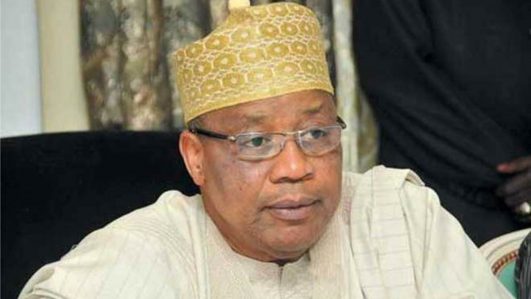After more than three decades of speculation, former military President General Ibrahim Badamosi Babangida has publicly admitted that Chief Moshood Kashimawo Olawale (MKO) Abiola won the historic June 12, 1993, presidential election. President Bola Ahmed Tinubu hailed this confession as a courageous step towards setting the record straight in Nigeria’s political history.
Tinubu, who was the Special Guest of Honour at the launch of Babangida’s autobiography, A Journey in Service, and the fundraising for the IBB Presidential Library Project, praised the former leader for acknowledging Abiola’s victory, despite the political crisis that followed the annulment of the election.
A Long-Awaited Admission
Speaking at the event in Abuja on Thursday, Babangida confirmed for the first time that Abiola had indeed won what is widely regarded as Nigeria’s freest and fairest election.
This admission comes 32 years after the election was controversially annulled by Babangida’s administration, a decision that plunged Nigeria into political turmoil and led to his resignation in August 1993.
President Tinubu, acknowledging the significance of Babangida’s statement, said, “I am glad about the revelation of June 12. My General, we will not forget to pray for you. I listened to you carefully. I am not here to read a speech. I am here to pay homage.”
The Impact of the Annulment
The annulment of the June 12 election remains one of the most controversial political decisions in Nigeria’s history. The election, which saw Abiola, the candidate of the Social Democratic Party (SDP), emerge as the apparent winner, was nullified on June 23, 1993. Babangida’s government cited ‘security concerns’ and the need to preserve national unity as reasons for the cancellation, but critics have long viewed it as a betrayal of democracy.
Abiola’s subsequent struggle to reclaim his mandate led to his detention in 1994 by the late military ruler General Sani Abacha. He later died in detention on July 7, 1998, under mysterious circumstances, a month after Abacha’s sudden death.
Tinubu’s Tribute to Babangida’s Leadership
Despite the historical tensions surrounding Babangida’s legacy, President Tinubu commended his contributions to Nigeria’s development, particularly in fostering private sector growth.
“Let me say thank you for everything, for who you are, what you are, and how you have contributed to the history of this great country,” Tinubu said.
The President, who has long been an advocate for recognizing June 12 as Nigeria’s true Democracy Day, emphasized the importance of revisiting history with honesty. His administration, in 2018, officially declared June 12 as Democracy Day, replacing the previous date of May 29, in recognition of Abiola’s role in Nigeria’s democratic struggle.
Nigeria’s Path Forward
Beyond reflecting on past events, Tinubu used the occasion to highlight the need for national unity and economic transformation. He urged Nigerians to channel their energy into rebuilding the country rather than seeking opportunities abroad.
“I am glad about what is happening in America and Europe, the contradiction you have seen now. What is it telling us? It is telling us to wake up and make Africa a better place, particularly this country, Nigeria,” he said.
He further assured Nigerians of his commitment to making bold economic decisions, regardless of the challenges they may bring. “I have seen the need to make some decisions on behalf of this country. I want to thank all of you for your mandate, patience, and perseverance.”
Babangida’s Legacy and the Political Fallout of June 12
Babangida’s tenure, from 1985 to 1993, was marked by significant economic reforms, including the introduction of the Structural Adjustment Program (SAP), which liberalized the economy but also led to inflation and economic hardships. However, his handling of the democratic transition remains a major point of contention.
His admission of Abiola’s victory now brings closure to a chapter that has been heavily debated in Nigerian politics. Many have long called for a full disclosure of the actual election results and for justice to be served posthumously to Abiola.
Reactions to Babangida’s Statement
Babangida’s admission has sparked mixed reactions across Nigeria. Pro-democracy activists and political commentators view it as a long-overdue acknowledgment of truth, while some question why it took him 32 years to make the revelation.
Former Kaduna State lawmaker, Shehu Sani, reacted via social media, stating, “At last, the ghost of June 12 is being exorcised. This is a historic moment, but it does not erase the injustices that followed the annulment.”
Human rights lawyer Femi Falana also weighed in, describing the statement as “important for historical accuracy,” but insisting that it should be followed by official recognition of Abiola as a former president of Nigeria.
Meanwhile, some political analysts argue that Babangida’s statement might have been influenced by the changing political landscape and the need to rehabilitate his image.
What’s Next?
With Babangida’s confirmation of Abiola’s victory, questions remain about how Nigeria will officially address the injustice of the annulment. Calls for the government to formally recognize Abiola as a past president have resurfaced, along with demands for an official apology from the state.
While the Nigerian government posthumously conferred the title of Grand Commander of the Federal Republic (GCFR) on Abiola in 2018, many believe more should be done to honor his legacy.
As Nigeria continues to grapple with its democratic journey, Babangida’s admission serves as a reminder of the country’s tumultuous political past and the need for leaders to uphold democratic principles.
For now, Tinubu’s praise for Babangida signals a shift towards reconciliation and historical clarity. However, whether this revelation leads to any significant policy changes remains to be seen.

